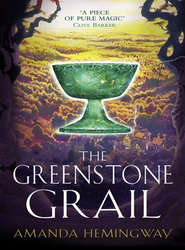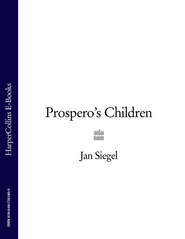По всем вопросам обращайтесь на: info@litportal.ru
(©) 2003-2024.
✖
Witch’s Honour
Автор
Год написания книги
2018
Настройки чтения
Размер шрифта
Высота строк
Поля
He thought aloud.
Without realising it, he had fallen asleep. The unfamiliar words touched a chord deeper than memory. He was in a city—a city of long ago, with pillars and colonnades and statues of men and beasts, and the dome of a temple rising above it all flashing fire at the sun. He heard the creak of wooden wheels on paving, saw the slaves shovelling horse-dung with the marks of the lash on their backs. There was a girl standing beside him, a girl whose black hair fell straight to her waist and whose eyes were the pure turquoise of sea-shallows. ‘—help,’ she was saying. ‘You must help me—’ but her face changed, dissolving slowly, the contours re-forming to a different design, and he was in the dark, and a red glimmer of torchlight showed him close-cropped hair and features that seemed to be etched in steel. The first face had been beautiful but this one was somehow familiar; he saw it with a pang of recognition as sharp as toothache. There was a name on his lips—a name he knew well—but it was snatched away, and he woke abruptly not knowing where he was, reaching for the dream as if it were the key to his soul.
One of the male nurses was leaning over him, clasping his shoulder with a scrubbed pink hand. ‘You called out,’ he explained. ‘I was outside. I think you said: “I need help.”’
‘Yes,’ said Lucas. ‘I did. I do.’
The young nurse smiled a smile that was reassuring—a little too reassuring, and knowing, and not quite human.
‘Help will be found,’ he said.
A damp spring ripened slowly into the disappointment of summer. Wizened countrymen read the signs—‘The birds be nesting high this year’—‘The hawthorn be blooming early’—‘I seed a ladybird with eight spots’—and claimed it would be hot. It wasn’t. In London Gaynor moved back into her refurbished flat and stoically withstood the advances of her host of New Year’s Eve in his quest for extramarital sympathy. Will Capel returned from Outer Mongolia and invited his sister to dinner, escorting her to the threshold of the Caprice restaurant before recollecting that all he could afford was McDonald’s. Fern drank a brandy too many, picked up the tab, and went home to dream the dream again, waking to horror and a sudden rush of nausea. In Queen Square, Dana Walgrim did not stir. Lucas devoted more time to the pursuit of venture capitalism, doing adventurous things with other people’s capital, but rivals said he had lost his focus, and the spectre that haunted him was not that of greed. And at Wrokeby the hovering sun ran its fingers over the façade of the house, and poked a pallid ray through an upper window, withdrawing it in haste as the swish of a curtain threatened to sever it from its source.
It was late May, and the clouds darkened the long evening into a premature dusk. The sunset was in retreat beyond the Wrokewood, its lastlight snarled in the treetops on Farsee Hill. Three trees stood there, all dead, struck by lightning during the same storm that had shattered the conservatory at the house, and although there was fresh growth around each bole the three crowns were bare, leafless spars jutting skyward like stretching arms. Folklorists claimed that Farsee Hill was a contraction of pharisee, or fairy, and liked to suggest some connection with an occult curse, the breaking of a taboo, the crossing of a forbidden boundary, though no one had yet come up with a plot for the undiscovered story. That evening, the clouds seemed to be building up not for a storm but for Night, the ancient Night that was before electricity and lamps and candles, before Man stole the secret of fire from the gods. The dark crept down over wood and hill, smothering the last of the sun. In the smaller sitting room, another light leaped into being, an ice-blue flame that crackled and danced over coals that glittered like crystal. On the floor, the circle took fire, in a hissing trail that swept around the perimeter at thought-speed. The witch stood outside it, close to the hearth. Her dress was white, sewn with sequins that flung back the wereglow in tiny darts of light. But her hair was shadow-black, and her eyes held more Night than all the dark beyond the curtains.
Dibbuck crouched in the passage, watching the flicker beneath the door. He heard her voice chanting, sometimes harsh, sometimes soft and sweet as the whisper of a June breeze. He could feel the slow build-up of the magic in the room beyond, the pull of power carefully dammed. The tongue of light from under the door licked across the floorboards, roving from side to side as though seeking him out. He cowered against the wall, shivering, afraid to stay, unable to run. He did not fear the dark but the Night that loomed over him now seemed endless; he could not imagine reaching another dawn. Within the room the chant swelled: the woman’s voice was full of echoes, as if the thin entities of air and shadow had added their hunger to hers. There was a whoosh, as of rushing flame, and the door flew open.
The wereglow sliced down the passage like a blade, missing the goblin by inches. It cut a path through the darkness, a band of white radiance brighter than full moonlight, stretching down the stair and beyond, piercing the very heart of the house. And then Dibbuck heard the summons, though it was in a language he did not understand, felt it reaching out, along the path, tugging at him, drawing him in. He pulled his large ears forward, flattening them against his skull with clutching hands, shutting out all sound. But still he could sense the compulsion, dragging at his feet, so he dug his many toes into crevices in the wood, and wrenched a splinter from the wainscot, driving it through his own instep, pinning himself to the floor with a mumbled word which might have been flimsy goblin-magic or a snatch of godless prayer. He had closed his eyes but when his ears were covered again he reopened them. And he knew that if he endured another thousand years, he would never forget what he saw.
There was a mist pouring past him along the beam of light—a mist of dim shapes, formless as amoeba, empty faces with half-forgotten features, filmy hands wavering like starfish, floating shreds of clothing and hair. Even though his ears were blocked he heard a buzzing in his head, as if far-off cries of desperation and despair had been reduced to little more than the chittering of insects. He wanted to listen but he dared not, lest he respond to the summons and lose himself in that incorporeal tide. He saw the topless torso of Sir William grasping his own head by its wispy locks: the eyes met his for an instant in a fierce, helpless stare. He glimpsed the tonsure of a priest, slain in the Civil War, a coachman’s curling whip and flapping greatcoat, the swollen belly of a housemaid, impregnated by her master. And amongst them the fluid gleam of water-sprites and the small shadowy beings who had lived for centuries under brick or stone, no longer able to remember what they were or who they had once been. Even the imp from the Aga was there, trailing in the rear, clutching in vain at the door-frame until he was wrenched into the vortex of the spell.
When the stream of phantoms had finally passed Dibbuck plucked out the splinter and limped forward, still blocking his ears, until he could just see into the room. The pain of his foot went unregarded as he watched what followed, too petrified even to shiver. Within the circle, the ghosts were drawn into a whirling, shuddering tornado, a pillar that climbed from floor to ceiling, bending this way and that as the spirits within struggled to escape. Distorted features spun around the outside, writhing lips, stretching eyes. The witch stood on the periphery with her arms outspread, as if she held the very substance of the air in her hands. The spell soared to a crescendo; the tornado spun into a blur. Then the chant stopped on a single word, imperative as fate: ‘Uvalé!’ And again: ‘Uvalé néan-charne!’ Blue lightning ripped upwards, searing through the pillar. There was a crack that shook the room, and inside the circle the floor opened.
The swirl of ghosts was sucked down as if by an enormous vacuum, vanishing into the hole with horrifying speed. The goblin caught one final glimpse of Sir William, losing hold of his head for the first time since his death, his mouth a gape of absolute terror. Then he was gone. What lay below Dibbuck could not see, save that it was altogether dark. The last phantom drained away; the circle was empty. At a word from the witch, the crack closed. On the far side of the room he registered the presence of Nehemet, sitting bolt upright like an Egyptian statue; the light of the spellfire shone balefully in her slanted eyes. Slowly, one step at a time, he inched backwards. Then he began to run.
‘We missed one,’ said the woman. ‘One spying, prying little rat. I do not tolerate spies. Find him.’
The cat sprang.
But Dibbuck had grown adept at running and dodging of late, and he was fast. The injury to his foot was insubstantial as his flesh; it hurt but hardly hindered him. He fled with a curious hobbling gait, down the twisting stairs and along the maze of corridors, through doors both open and shut, over shadow and under shadow. Nehemet might be swifter, but her solidity hampered her, and at the main door she had to stop, mewing savagely and scratching at the panels. Outside, Dibbuck was still running. He did not hesitate, nor look back. Through the Wrokewood he ran, and up Farsee Hill, and in the shelter of three trees he halted to rest, hoping that in this place his wild cousins of long ago might have some power to keep him from pursuit.
The conservatory was completed; the gypsy and his co-workers had been paid and dismissed. ‘You have not found him,’ Morgus said to the sphinx-cat. ‘Well. It is not important. He was only a goblin, a creature of cobwebs and corners, less trouble than a dormouse. We have greater matters in hand.’ It was four days since the exorcism, and the house grew very still when she passed: the curtains did not breathe, the stairs did not creak. Somewhere deep in its ancient mortar, in the marrow of its walls, it felt lonely for its agelong occupants, lonely and uncomprehending. It sensed the invasion of alien lights, the laying down of new shadows, the incursion of elementals lured by the force of dark magic. It missed the familiar ghosts, as a stray dog given a well-meaning bath misses its native fleas. Inside, the atmosphere changed, becoming bleak and watchful, though no one was watching any more.
The prisoner in the attic felt it, if only because there was nothing else to feel. Morgus rarely visited him any more, even to gloat, so he would talk to himself, and the house, and a moth which was slight enough to slip past the spells, until he grew impatient with it, and crushed it in one vicious hand. He had the strength to wrench the iron bars from their sockets and snap the chains that bound him as if they were made of rust, but magic reinforced both chain and bar, and though he tugged until his muscles tore it was futile. ‘What is she doing?’ he would ask the house, and when it made no answer he could sense the new silence and stillness permeating from below. He lay long hours with his ear to the floor, listening. He knew when the ghosts were gone, and he heard the padding of Nehemet’s paws as she hunted, and the softest rumour of Morgus’ voice grated like a saw on his thought. Sometimes he would howl like a beast—like the beast he was—but nobody came, and the sound bounced off the walls of his prison and returned to him, finding no way out. Sometimes he wept, hot red tears of frustration and rage which steamed when they touched the ground. And then he would curse Morgus, and the attic prison, and the whole world, until he was hoarse with cursing, and in the silence that followed his lips would shape the name of his friend—his one friend in all the history of time—and he would call for help in a moth-like whisper, and crush his mouth against the floor in the anguish of the unheard.
In the reconstructed conservatory, Morgus was planting the Tree. It was midnight, under the pale stare of an incurious moon. The triangular panes of the roof cast radiating lines of shadow around the stone pot in which Morgus placed the sapling. Here was a different kind of magic, a magic of vitality and growth: the air shimmered faintly about the bole, and the leaves rippled, and the sap ascended eagerly through slender trunk and thrusting twig with a throb like the beat of blood. Morgus crooned her eerie lullabyes, and fed it from assorted vials, and the cat sat by, motionless as Bastet save for the twitch of her tail. ‘We are on the soil of Britain: my island, my kingdom,’ said the witch. ‘Here, you can grow tall and strong. Fill my flagons with your sap, and bring forth fruit for me—fruit that will swell and ripen—whatever that fruit may be.’ She gathered up the discarded wrappings and left the conservatory, Nehemet at her heels. Behind them, unseen, the heavy base of the urn began very slowly to split, millimetre by millimetre, as the severed taproot forced its way through stone and tile, flooring and foundation, down into the earth beneath.
‘I wish you’d stop giving me advice,’ Will Capel complained. He and his sister were returning from Great-Aunt Edie’s funeral in the West Country, an event that many of her relatives felt was long overdue. She had ended her days in a retirement home near Torquay, but this had not prevented her from descending on hapless family members for Christmas, Easter, weddings, anniversaries and christenings, not to mention the funerals of those less hardy than herself. Since she had been ninety-one when she died, Fern felt excessive grief was not called for. While she drove, she found she was remembering her own aborted wedding, and Aunt Edie’s hovering presence there, usually clutching a copita of sherry.
‘What did you say?’
‘I said, I wish you would stop giving me advice.’
‘I didn’t,’ Fern said serenely. ‘I never give advice.’
‘It’s the way you never give advice,’ said Will. ‘I can feel the advice you’re not giving me radiating out from your brain in telepathic pulses. And there’s your expression.’
‘I haven’t got an expression.’
‘Yes you have. It’s your favourite cool, you-can’t-guess-what-I’m-thinking expression. If we were playing poker, I’d know you had a particularly sneaky Royal Flush. As it is, I’d be prepared to bet you’re thinking about Aunt Edie’s last trip to Yorkshire, and your wedding-that-wasn’t, and that means you’re about to criticise my love life.’
‘Your love life,’ said Fern, ‘is entirely your own affair. Or several affairs, as the case may be.’
‘You see?’ said Will. ‘Love life: criticism.’
Fern sucked her lip in an attempt to suppress a smile. ‘I hate to disappoint.’
Will gave a grin which stiffened gradually into something more artificial. ‘How is Gaynor?’
‘You’ve been a long time asking,’ Fern said lightly. Her eyes were on the road; Will found that her profile was no longer something he could read. ‘She got over the flautist very quickly, which may indicate that there was not much to get over. A recent news bulletin told me she was still resisting the advances of Hugh, slightly estranged husband of Vanessa. However, sources close to Miss Mobberley inform me that she may not be able to hold out. When men cry on her shoulder, she has a tendency to go soggy inside.’
‘Has she tried waterproof clothing?’ said Will, a little too sharply. ‘Anyway, I didn’t want a resumé of her sexual activities. I just wanted to know how—she—is.’
‘Last weekend,’ said Fern scrupulously, ‘she was perfectly well.’
There was complete silence for almost a mile. Since Fern had decided recently she did not want music on while she drove, believing it was a serious distraction, the quiet was as noticeable as a power-cut in a shopping mall.
Eventually, Will said, changing the subject without apology: ‘I may be going to India later this year.’ Fern made an interrogative noise. ‘Looks like Roger and I might have got our first real commission. Someone at BBC 2 likes the Himalayan idea. You know: tales of the hidden kingdoms. Power politics in Buddhism, the true origins of Shangri-La, that kind of stuff. I told you about it in the Caprice.’
‘If it comes off,’ said Fern, ‘you can take me to the Caprice.’
‘I did take you to the Caprice!’
‘Next time,’ his sister said darkly, ‘you pay for it as well.’
It was late by the time they reached London and Will accepted an invitation to share a takeaway in Fern’s flat. They bought an assortment of Thai nibbles and a bottle of Chardonnay and took them back to Pimlico. Once inside, Fern switched on lamps, drew the curtains, lit a scented candle. ‘There’s something about funerals,’ she said. ‘The smell always stays with you. That damp, rusty sort of smell you get when people take out the black coat they haven’t worn for years and then stand around for too long in the rain.’
‘It didn’t rain,’ Will pointed out, uncorking the wine.
‘The air was wet,’ Fern insisted.
It was after they had sat down and were opening up the cartons that she went suddenly still and quiet. ‘What is it?’ Will asked, watching her face change.
Fern said nothing for a few seconds. When she spoke again, it was a half-tone louder. ‘Show yourself. This is my brother: his presence need not trouble you. He is accustomed to the ways of your folk.’ And, after a pause: ‘I don’t wish to Command you. That would be discourteous, and I should deeply regret any further discourtesy. You know I want friendly relations with the Queen.’
The Queen? Will mouthed, his eyebrows shooting upwards.
Fern ignored him. Her gaze had focused on a place at the foot of the curtains, where the drapes were bunched together in many folds beside the looping leaves of a pot-plant. Presently, Will saw some of the shadows detach themselves and move forward, taking shape in the light. A diminutive, ungainly shape, hunch-shouldered and bow-legged, with long simian arms. Fern noticed his patchwork clothing looked newer than last time and he had acquired a species of malformed hat, squashed low over his brow, with the words ‘By Appoyntmnt’ embroidered on it in crooked stitches. His tufted ears were thrust through slits in the brim; his sloe eyes gazed slyly from underneath.
‘Skuldunder,’ Fern acknowledged.
‘Who invited you in?’ Will demanded.
‘It isn’t necessary,’ Fern sighed. ‘He’s a burglar. We’ve met before. He usually burgles on behalf of Mabb, Queen of the goblins. So are you here on private business, or does this visit have an official sanction?’
‘The Queen sent me,’ the goblin prated, briefly inflating his hollow chest. ‘She says, she is graciously pleased to accept your gifts, and…and your friendship. It is a great honour.’
‘For whom?’ Will murmured, fascinated. Fern stood unobtrusively on his foot.










